Data centers are crucial for storing and managing vast amounts of data for businesses and organizations. With so much sensitive information at stake, it’s essential to have effective fire suppression strategies in place to protect these facilities from the devastating impact of fires.
There are several best practices and tips that data center operators can follow to ensure the safety of their facilities and the data stored within them. Here are some key strategies to consider:
1. Implement a comprehensive fire suppression system: Data centers should be equipped with a state-of-the-art fire suppression system that includes a combination of fire alarms, smoke detectors, and automatic sprinklers. These systems should be regularly inspected and tested to ensure they are in proper working order.
2. Use clean agent fire suppression systems: Clean agent fire suppression systems are ideal for data centers because they can quickly extinguish fires without causing damage to sensitive electronic equipment. These systems use chemicals or gases to suppress fires, rather than water, which can cause damage to servers and other equipment.
3. Consider using air sampling systems: Air sampling systems can detect smoke particles in the air before a fire has a chance to fully develop. These systems can provide early warning of a potential fire, allowing data center operators to take swift action to prevent further damage.
4. Have a robust fire evacuation plan: In the event of a fire, it’s crucial to have a well-defined evacuation plan in place. Data center staff should be trained on how to respond to a fire emergency, including how to safely evacuate the building and where to gather outside for accountability.
5. Conduct regular fire drills: Regular fire drills are essential for ensuring that data center staff are prepared to respond quickly and effectively in the event of a fire. These drills should be conducted at least twice a year to practice evacuation procedures and test the effectiveness of the fire suppression system.
6. Keep combustible materials to a minimum: Data centers should be designed with fire safety in mind, including minimizing the use of combustible materials in the facility. This can help prevent fires from spreading quickly and causing extensive damage.
7. Monitor environmental conditions: Monitoring environmental conditions, such as temperature and humidity levels, can help data center operators identify potential fire hazards before they escalate. By keeping a close eye on these factors, operators can take proactive measures to mitigate risks and prevent fires from occurring.
In conclusion, fire suppression strategies are essential for protecting data centers from the devastating impact of fires. By implementing best practices and following these tips, data center operators can ensure the safety of their facilities and the data stored within them. It’s important to regularly review and update fire suppression plans to ensure they remain effective and up to date with the latest technologies and best practices.


Leave a Reply